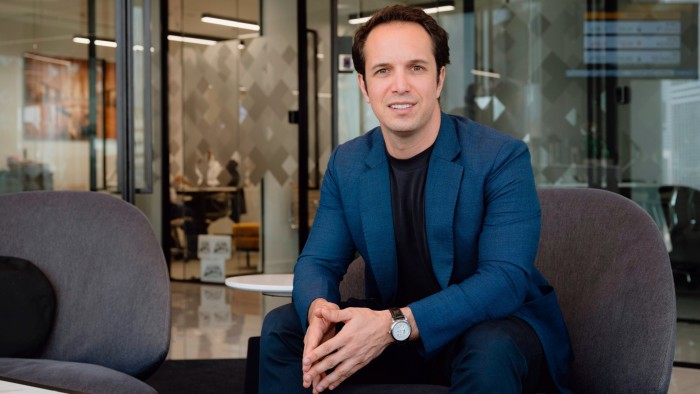When an Abu Dhabi artificial intelligence company wanted access to an enormous data centre in France earlier this year, it turned to a former child actor turned investment banker to broker the deal.
Zachary Cefaratti, founder of boutique advisory Dalma Capital, has leveraged an eclectic contacts book that includes OpenAI chief Sam Altman and senior Middle Eastern politicians to become a below-the-radar fixer for data centres, cryptocurrency mining and technology groups in the Gulf.
The 37-year-old’s clients include G42, the AI group chaired by powerful Emirati royal Sheikh Tahnoon bin Zayed al-Nahyan; Abu Dhabi sovereign investor ADQ; and the encrypted social media network Telegram, whose founder Pavel Durov lives in Dubai and was detained and charged in France last year.
According to executives who have worked on transactions with Cefaratti, the Californian is one of a few niche dealmakers to profit from two new trends: the insatiable desire for more computing capacity to run AI, and the Gulf’s desire to fund the nascent technology.
“I’d like to think that I’m more than just riding a wave,” Cefaratti told the Financial Times. “It’s not completely by accident . . . I spend a lot of time thinking about and researching these things . . . not being like most investment bankers, really getting into the tech.”
“He’s an invisible kingpin in data centres,” said Andy Tang, partner at Draper Associates.
Dalma advised companies in the G42 group, including on a “partnership with a tier one hyperscaler”. Microsoft acquired a $1.5bn stake in the Abu Dhabi-based company last year. Cefaratti also sourced the French data centre deal between G42 subsidiary Core42 and France’s DataOne, which closed this year.
This May, Dalma was joint arranger for Telegram’s $1.7bn bond issuance, which was led by Jefferies. Cefaratti had previously arranged meetings for Telegram with Abu Dhabi investors.
For Cefaratti, the UAE’s bet on becoming an AI hub is a natural fit: “AI consumes massive amounts of energy and it’s very capital intensive.” The nation can then become “an exporter of intelligence”.
Cefaratti’s Dubai office features a sculpture of Babar the elephant holding a bag of bitcoin, a gift from the daughter of Dubai property tycoon turned data centre investor Hussain Sajwani. Cefaratti said he counted Binance founder Changpeng Zhao, another Dubai resident who served jail time in the US, as a friend.
The AI boom came after Cefaratti suffered a career low. Between 2019 and 2023, he was investigated by the financial centre’s watchdog, which had become stricter after Dubai investment firm Abraaj imploded under its supervision.
He was charged with misleading the regulator, and hit with a $162,500 fine and barred from acting as senior executive officer for two years. The Dubai Financial Services Authority accused him of giving “false, misleading and deceptive information” about trades placed in 2016 on Dalma’s behalf, by a person who was not employed by the fund.
“I think the big mistake I made was not taking it seriously,” said Cefaratti. “It just seemed like such a small thing from so long ago.”
Cefaratti’s early career was as a child actor appearing in shows such as Star Trek: Deep Space Nine, while his grandmother encouraged him to invest his earnings in bonds and shares.
He dropped out of college to care for his father in 2009, starting a small health insurance brokerage business to cover medical bills. He returned to his studies and joined students opening a hedge fund; they were mocked as “Clueless Capital”.
The finance-focused student left an impression on academics at Franklin University Switzerland. Cefaratti was “one of those students you don’t forget”, remarked his former professor Roberto Cordon, saying he would receive emails from Cefaratti at 4am.
Cefaratti headed to the Gulf in late 2012. “I bought what [Dubai was] selling,” he said. “I probably bought it a little too early.” His fledgling hedge fund Dalma Capital managed just a “couple of million dollars”, and local investment never materialised.
Pivoting, Cefaratti used his expensive Dubai International Financial Centre licence as a platform for other funds, including one in cryptocurrency, and later started an investment conference.
Recommended
In 2018, he decided to expand Dalma into advisory and hired an investment banker from Morgan Stanley.
“We were getting calls from organisations that have huge portfolios of excess energy that they were looking to monetise,” Cefaratti recalled. These clients included ADQ, which Cefaratti steered into mining bitcoin — a way to convert electricity into cryptocurrency.
At about the same time, Cefaratti said he was getting to know Draper Associates, which formally appointed him venture partner in 2023.
As Dubai took off during the Covid-19 pandemic, when it bet on reopening as other cities stayed locked down, Cefaratti said his business finally started to do well. Using venture capital terminology, he said: “That’s when the product market fit aligned.”
In 2022, he took autonomous driving company Pony.ai on a funding roadshow in Saudi Arabia, alongside investment bank Moelis. The investment fund belonging to giga project Neom later announced a $100mn investment in the Chinese group. Work with G42 and others followed.
Dalma has just 21 employees. But according to Cefaratti, he is filling a gap. Clients raising funds could just call a bulge bracket bank, but if they are “putting together a complex deal that has multiple layers, that needs customers and technology; there’s not many one-stop shops that can do that”.


